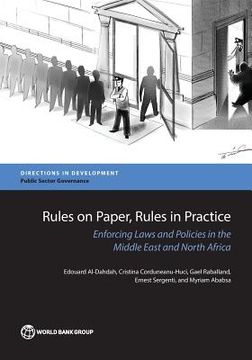Compartir
Rules on Paper, Rules in Practice: Enforcing Laws and Policies in the Middle East and North Africa (en Inglés)
Edouard Al-Dahdah
(Autor)
·
Cristina Corduneanu-Huci
(Autor)
·
Gael Raballand
(Autor)
·
World Bank Publications
· Tapa Blanda
Rules on Paper, Rules in Practice: Enforcing Laws and Policies in the Middle East and North Africa (en Inglés) - Al-Dahdah, Edouard ; Corduneanu-Huci, Cristina ; Raballand, Gael
$ 40.726
$ 67.877
Ahorras: $ 27.151
Elige la lista en la que quieres agregar tu producto o crea una nueva lista
✓ Producto agregado correctamente a la lista de deseos.
Ir a Mis Listas
Origen: Estados Unidos
(Costos de importación incluídos en el precio)
Se enviará desde nuestra bodega entre el
Martes 23 de Julio y el
Lunes 05 de Agosto.
Lo recibirás en cualquier lugar de Argentina entre 1 y 3 días hábiles luego del envío.
Reseña del libro "Rules on Paper, Rules in Practice: Enforcing Laws and Policies in the Middle East and North Africa (en Inglés)"
The primary focus of this book is on a specific outcome of the rule of law: the practical enforcement of laws and policies, and the determinants of this enforcement, or lack thereof. Are there significant and persistent differences in implementation across countries? Why are some laws and policies more systematically enforced than others? Are good laws likely to be enacted, and if not, what stands in the way? We answer these questions using a theoretical framework and detailed empirical data and illustrate with case studies from Morocco, Tunisia and Jordan. We believe that the best way to understand the variation in the drafting and implementation of laws and policies is to examine the interests and incentives of those responsible for these tasks policymakers and bureaucrats. If laws and their enforcement offer concrete benefits to these ruling elites, they are more likely to be systematically enforced. If they don't, implementation is selective, discretionary, if not nil. Our first contribution is in extending the application of the concept of the rule of law beyond its traditional focus on specific organizations like the courts and the police, to economic sectors such as customs, taxation and land inheritance, in a search for a direct causal relationship with economic development outcomes. Instead of limiting ourselves to a particular type of organization or a legalistic approach to the rule of law, we present a broader theory of how laws are made and implemented across different types of sectors and organizations. Our second contribution is in demonstrating how powerful interests affect implementation outcomes. The incentives elites have to build and support rule-of-law institutions derive from the distribution of power in society, which is partly a historical given. The point we make is that it is not deterministic. Realigning the incentive structures for reform among key actors and organizations, through accountability and competition, can dramatically improve the chances that rule-of-law institutions will take root. On the other hand, building the capacity of organizations without first changing institutional incentives is likely to lead to perverse outcomes."

